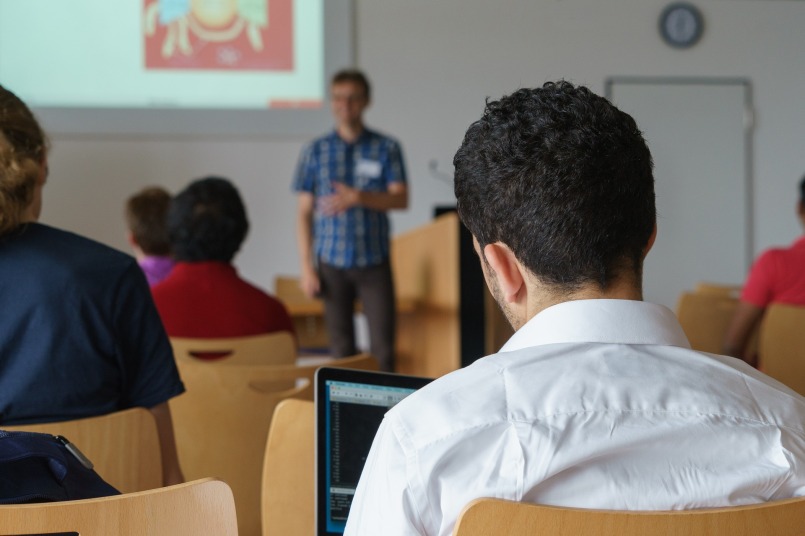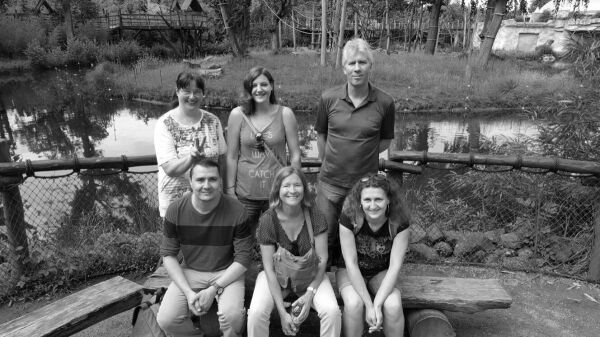B.Sc. Medical Engineering
Study period
6 semesters (3 years)
Credits
180
Study begin
Winter semester
Study place
Campus Duisburg and Essen
Language
German
Description
Due to the close cooperation of the engineering sciences with the medical faculty, the students of the bachelor's program Medical Engineering experience a 'real' basic medical education in the introductory subject areas, such as anatomy, medical terminology, physiology, biochemistry, etc., at the hospital in Essen. These basic subjects make up about one third of all basic courses in the program. The direct insight into the medical teaching, research and, where applicable, working culture offers students a great opportunity to find their way competently in the medically influenced fields of medical technology, in order to also be able to actively shape these in the context of a future working environment.
In particular, the program imparts knowledge and skills that serve to overview scientific methods in the highly interdisciplinary field of medical technology in context and to apply them to the analysis and solution of challenging problems. This includes, in addition to typical engineering problems, the mechanisms and interactions at the numerous interfaces between technical systems and organic/biological structures.
Graduates understand the mathematical terms, definitions and interrelationships required for medical engineering and can apply appropriate calculation methods. They are also familiar with the medical terminologies required for medical technology and can use them correctly in technical discussions. Furthermore, graduates understand the medical, chemical, physical, electrotechnical, mechanical, informatics and process engineering phenomena/relationships essential in medical technology and can derive their mathematical (if necessary also algorithmic) description from basic equations and definitions. Ultimately, graduates understand the medical interrelationships relevant to medical technology as well as the essential engineering concepts and methods. They are able to apply the appropriate methods and technologies for analysis in the context of the concrete design of medical technology components, devices and systems.
On the one hand, the bachelor's degree program in Medical Engineering leads to a first professional qualification and qualifies students to work in various industries as medical technology engineers in numerous different fields of activity, such as research and development, project planning, sales, commissioning, operational support or maintenance, quality and process control. On the other hand, the bachelor's degree in Medical Engineering qualifies students to continue their studies in the consecutive research-oriented master's degree program in Medical Engineering.
Study at UDEInformation about the degree program
Study plan
Study plan
You can find the examination regulations for your study program here: Examination regulations according to study programs
Study plan: B.Sc. Medical Engineering
Module handbook: B.Sc. Medical Engineering (PO24)
Information material
Study plans as well as information about the modules in the study program can be found in the module handbook: B.Sc. Medical Engineering
Admission
Admission requirements
- general higher education entrance qualification (Abitur)
- a relevant subject-linked university entrance qualification
- a certificate recognized as equivalent by law or by the competent state authority
Admission is also possible without an Abitur (e.g. with a Fachhochschulreife), if the applicant proves a special subject-related aptitude and a general education corresponding to the requirements of the university within the framework of an aptitude test or aptitude assessment. For the aptitude test, the previous school and extracurricular education and qualifications with details of the subjects completed and the grades achieved must be proven by copies of certificates. Before making its decision, the Examination Committee may invite the applicant to an interview and/or a written and/or oral aptitude test. The respective form of the test will be announced in good time before the date.
The application deadline for admission to the aptitude test is June 15. Applicants with a general university entrance qualification do not have to undergo the aptitude test.
Admission
- A local admission restriction applies. Registration takes place within the framework of the Dialog-Oriented Service Procedure (DoSV), initially via the Foundation for University Admission (hochschulstart.de). There you will receive your applicant identification number (BID) and your applicant authentication number (BAN). Please use these numbers to apply online within the application deadline at the student registrar’s office of the University of Duisburg-Essen.
-
Prospective students from non-EU countries submit their application to uni-assist (see application deadline).
Pre-courses
You can find a selection of for non-mandatory, but recommended preliminary courses at Mintroduce.
Language Skills
The language of instruction at the University of Duisburg-Essen is German (except in the English-language programs). Therefore, you must have good German language skills if you want to study successfully. The majority of foreign applicants must pass the "Deutsche Sprachprüfung für den Hochschulzugang" (DSH 2 level; with some exceptions) before beginning their studies.
- German nationals (persons who have acquired their higher education entrance qualification in Germany or at a German school abroad) do not require any special proof of German language skills.
- Citizens of an EU member state (and citizens of Iceland, Liechtenstein, Norway) or German citizens with a foreign educational qualification, as well as
- Citizens of a country outside the EU with a foreign university entrance qualification must pass the "Deutsche Sprachprüfung für den Hochschulzugang" (DSH 2 level) or the TestDaF (TDN 4) before the begin of their studies.
Information on the German Language Test for University Entrance (DSH)
Additional language skills
Individual courses may be held in English and in the vast majority of courses the underlying literature is written in English. Knowledge of English is therefore expected.
Internships accompanying studies
During the bachelor's degree program, students are required to complete a 12-week internship in a company.
Counseling and recognition of internships is provided by the Internship Office/ Internship Office for Compulsory Industrial Internships (https://www.uni-due.de/iw/de/studium/praktikantenamt.shtml).
Study abroad
A study abroad can be easily integrated into your degree program. With a wide range of international exchange programs, you can spend one or more semesters abroad without extending your studies.
Your planned courses and academic achievements are coordinated with your faculty in advance, ensuring that the credits you earn abroad can be easily recognized. Many students take this opportunity to gain international experience and new perspectives for their studies and future career.
Your exchange opportunities:
- Europe: through ERASMUS+ and Aurora partner universities, e.g., in Italy, Spain, Austria, France, Finland, Turkey, and many other countries.
- Asia: Our exchange program with two partner universities in Southeast Asia is particularly attractive, including Universiti Kebangsaan Malaysia (UKM) and Universitas Indonesia (UI).
- Worldwide: our faculty maintains numerous cooperation programs worldwide – from Brazil and Mexico to South Korea, Taiwan, Japan, and many other countries.
Further information:
https://www.uni-due.de/iw/en/international/fiw
General Information
Living & Studying at the University of Duisburg-Essen

Semester
The academic year is divided into semesters.
- Winter semester: from October to March
- Summer semester: from April to September

Lecture period
The winter lecture period usually starts in mid-October and ends in mid-February. In summer, the lecture period usually starts in mid-April and ends in July. During the winter semester there is a break of about two weeks during the Christmas holidays.

Examination phase
The examination phase begins about one week after the end of the lecture period and lasts about seven weeks.
Semester fee
All students have to pay a semester fee (social contribution) of about 320,- Euro per semester. You can find the current amount here. The social contribution includes, among other things, a semester ticket for public transportation in North Rhine-Westphalia and discounts on meals in the university's canteen and cafeteria.
Living expenses
We recommend to consider approximately 800 to 1000 Euro of personal expenses per month.
Accommodation
Accommodation is possible in dormitories of the Studierendenwerk and in premises of the free housing market. The rent in a room in a student dormitory is about 300,- Euro per month. You can find more information about housing options here.
Introduction of the institutes
Contact
You have questions? We have answers!

Support Center for (International) Engineering Students Student advisory service
SCIES Duisburg
room: SG 119
Geibelstr. 41
47057 Duisburg
Tel.: +49 (0)203 379 3776
E-mail: scies@uni-due.de
Opening hours: Check website

Student council Medical Engineering
We are your point of contact! If you have questions about your studies or general concerns about us or our lecturers, you can contact us. We will solve your problems and answer your questions directly if possible or forward you to the right people. Just write us an email (fsr.medizintechnik@uni-due.de) or contact us via Facebook or Instagram.
For prospective students and enrolled students General student counseling
ABZ offers counseling to prospective students, enrolled students and graduates on all questions concerning the choice of study program, studies and the transition into working career.
Support in the Faculty
Responsible person, Coordinator
Dr.-Ing. Stefan Werner
BB 313, Tel.: 0203/3792707
Opening hours: by appointment
Responsible person, Medicine
Jun.-Prof. Dr. rer. nat. Caroline Wiesehöfer
Universitätsklinikum Essen, Institut für Anatomie, 5. OG R6
Tel.: 0201/7234275
Opening hours: by appointment
Board of examiners
Chairwoman
Prof. Dr. Elsa Kirchner
Vice chairman
Prof. Dr. Daniel Erni






















